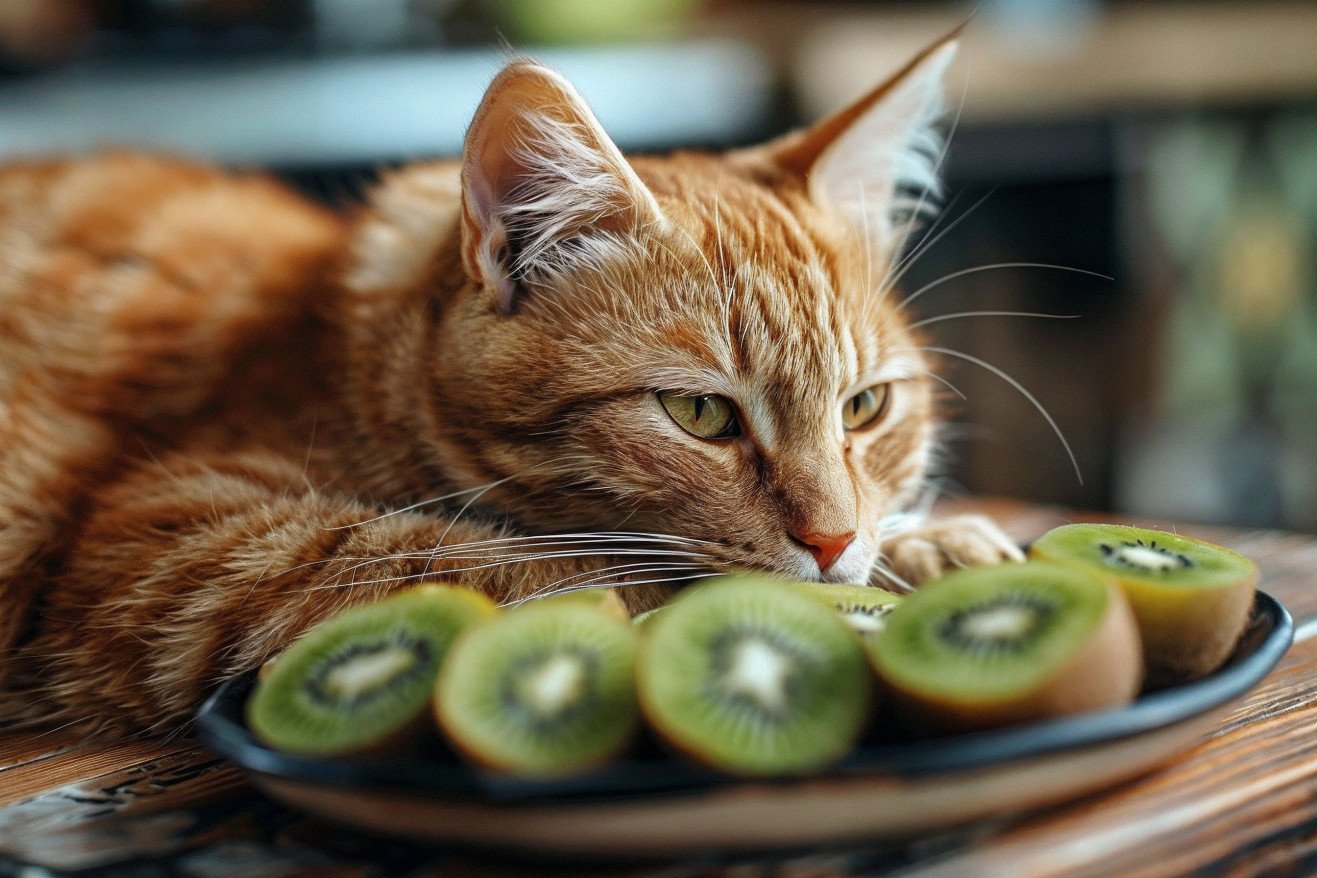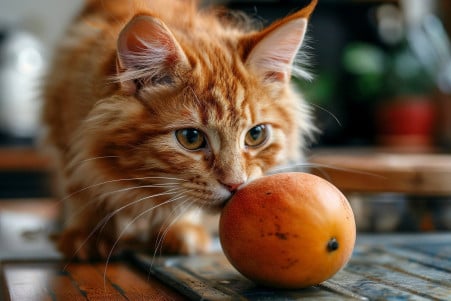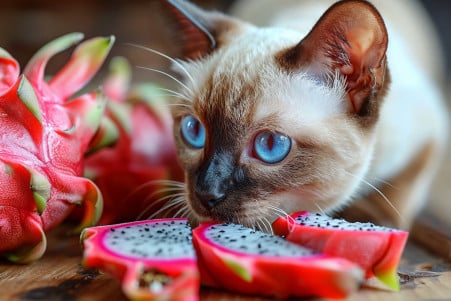Can Cats Eat Kiwi? A Look at This Tropical Fruit for Felines
9 April 2024 • Updated 8 April 2024

Can felines enjoy the tropical sweetness of kiwi fruit, or is this exotic treat dangerous for our furry friends? While kiwi is not poisonous to cats, its high fiber, sugar, and acid content means it's not the best choice for a cat treat. While a few small pieces are unlikely to cause problems for most cats, if consumed in excess, the furry fruit can lead to digestive issues such as vomiting or diarrhea. It's better to stick with cat-friendly fruits in small amounts as an occasional treat as part of a healthy diet.
In this article, we'll review the information provided by veterinary professionals and animal nutritionists to help you understand the potential pros and cons of giving your cat kiwi. You'll also learn which fruits are safe to give your cat as an occasional treat and which ones you should avoid giving them altogether. By learning more about the nutritional requirements of cats, you can ensure you're making choices that support their health and well-being.
Can cats eat kiwi?
Nutritional Value and Potential Benefits of Kiwi for Cats
Kiwi is full of nutrients like fiber, potassium, and vitamin C that could potentially be good for cats. The fiber in kiwi can aid digestion and help with regular bowel movements. Vitamin C is an antioxidant that may even help support the immune system in cats. Potassium is important for muscle and nerve function and blood pressure regulation.
That said, cats are obligate carnivores, and their nutritional needs are best met by a diet that's high in animal protein. As a result, the nutrients in kiwi are less likely to be beneficial to cats. While kiwi can help cats get some additional nutrients, it's not a substitute for the animal protein that's so important to their health. This is why it's important to feed cats kiwi in moderation, as too much fruit can lead to digestive issues and nutrient imbalances in an obligate carnivore like the cat. Because it's high in fiber, kiwi can lead to digestive issues if cats eat too much of it, which is why it's important to be aware of the potential risks and drawbacks.
Potential Dangers and Downsides of Feeding Kiwi to Cats
While kiwi can be a source of some important nutrients, it also comes with some potential dangers for cats. The high sugar content in kiwi can lead to weight gain and obesity if it's eaten in large amounts, and cats are particularly prone to obesity when they consume too many carbs. In addition, the acidity of kiwi can lead to digestive issues or discomfort for some cats, including vomiting and diarrhea, according to Hepper.
The furry skin of kiwi can also be a choking hazard for cats and can lead to intestinal blockages if it's ingested, according to Catster. Some cats may also be allergic to kiwi, and reactions can range from skin irritation to respiratory issues, according to The Tiniest Tiger.
Moderation and Preparation: How Much Kiwi Can Cats Eat and How to Feed It to Them
The Spot® blog suggests that kiwi can be given to cats once or twice a week, with each serving consisting of 1-2 bite-sized pieces that are no larger than a grape. Meanwhile, the Medium article by Calmar Isoe stresses that kiwi should be used in moderation and only as an occasional treat, not a regular part of a cat's diet.
To ensure that kiwi is safe for cats, it's important to remove the skin and seeds before feeding it to them, as the Medium article by Philiperneealexsandro explains that the furry skin can be a choking hazard and lead to gastrointestinal problems if swallowed. In addition, it's a good idea to start with small amounts of kiwi and watch for any negative side effects, as cats may have sensitivities or allergies to this fruit.
In the end, kiwi should never be a staple of a cat's diet, as they need to eat a diet that's high in animal protein to meet their nutritional needs as obligate carnivores. As a result, it's important to use kiwi in moderation and make sure it's prepared properly if you're going to give it to your cat as a treat.
How to Recognize and Treat Kiwi Allergies in Cats
Kiwi allergies in cats are rare but can occur due to the proteins found in the fruit. As explained by Kiwi Allergen Facts, Symptoms, and Treatment, the proteins in kiwi are made up of several different allergens, each of which can cause a different level of allergic reaction. As a result, the signs of a kiwi allergy in cats can vary from skin and stomach issues to respiratory problems and anaphylaxis.
Genetics and environmental factors are both potential causes of kiwi allergies in cats, according to Kiwi Allergy: Identifying Symptoms and Effective Treatments. If a cat is showing signs of an allergic reaction to kiwi, such as vomiting, diarrhea, or trouble breathing, it's important to get them to the vet right away, especially if the symptoms are severe.
Kiwi allergies in cats are managed by eliminating the allergen from the cat's diet and treating symptoms with antihistamines or other medications prescribed by a vet. As explained by the Cornell University College of Veterinary Medicine, it's important to identify the specific allergen with an elimination diet in order to effectively treat a food allergy in cats.
Fruit Allergies in Cats: Symptoms and Prevention
Although fruit allergies are rarer than animal protein allergies, cats can be allergic to specific fruits and their components, says Food Allergies in Cats: Common Symptoms & How to Treat Them. Symptoms of fruit allergies in cats are similar to those of other allergies and can include skin issues, itching, vomiting, diarrhea, and gastrointestinal upset. Cats can be allergic to proteins, carbs, and other compounds found in fruits.
To avoid fruit allergies, it's best to follow the same advice for introducing any new food to a cat: do it slowly and in small amounts, and watch for any signs of an allergic reaction, according to Cat Food Allergies & Intolerance | Hill's Pet. If a cat does have a fruit allergy, which can be indicated by the symptoms listed in Food Allergies in Cats | VCA Animal Hospital, it's important to see a vet and potentially try an elimination diet to figure out and then avoid the allergen(s), says Food Allergies in Cats | PetMD.
Conclusion: Feed Kiwi to Cats in Moderation
While kiwi is not poisonous to cats, its high fiber, sugar, and acid content mean it's not a good idea to give it to your cat regularly. Cats can eat kiwi flesh in small amounts, but it should be fed to them in moderation and the skin and seeds should be removed to prevent potential health issues. It should also be introduced to cats gradually and in moderation, with their owners watching for any signs of an upset stomach.
It's important to talk to a vet before you make any major changes to your cat's diet since their nutritional needs are best met by a balanced, meat-based diet. By learning about the potential benefits and drawbacks of feeding cats kiwi and other fruits, cat owners can make informed decisions about whether to give them to their pets as occasional, supplemental treats.


